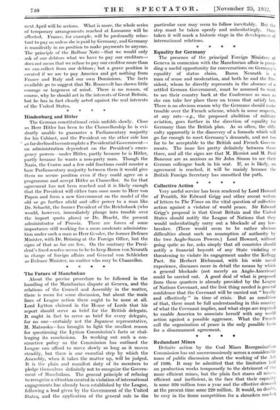Collective Action Very useful service has been rendered by Lord
Howard of Penrith, Sir Edward Grigg and other recent writers of letters to The Times on the vital question of collective action against a violator of world peace. Sir Edward Grigg's proposal is that Great Britain and the United States should notify the League of Nations that they would unhesitatingly carry out a blockade of any law- breaker. (There would seem to be rather obvious difficulties about such an assumption of authority by the two Anglo-Saxon Powers.) Lord Howard, without going quite as far, asks simply that all countries should notify a fmancial boycott of any State violating or threatening to violate its engagement under the Kellogg Pact. Sir Herbert Richmond, with his wide naval experience, discusses more in detail the means by which a general blockade (not merely an Anglo-American) could be carried out. A good deal of what is proposed from these quarters is already provided by the League of Nations Covenant, and the first thing needed is general confidence that the Covenant will be carried out "loyally and effectively" in time of crisis. But as condition of that, there must be full understanding in this country of what the Covenant implies, and what steps are required to enable America to associate herself with any world action against a possible aggressor. What the French call the organization of peace is the only possible basis for a disarmament agreement.
*






































 Previous page
Previous page